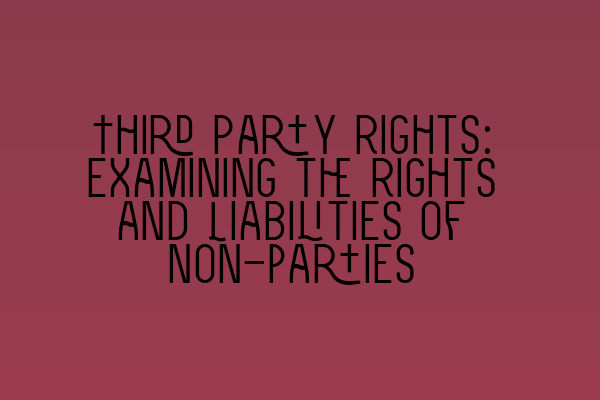Third Party Rights: Examining the Rights and Liabilities of Non-parties
When it comes to contract law, the focus is typically on the rights and obligations of the parties who have directly entered into the agreement. However, there are instances where the rights and liabilities of non-parties, known as third parties, come into play. Understanding the implications of third party rights is essential for solicitors and legal professionals alike.
What are Third Party Rights?
Third party rights refer to situations where a person who is not a party to a contract may still acquire certain rights and obligations under that contract. In other words, these non-parties have the ability to enforce terms of a contract or be held liable for breaches of contract, even though they are not among the original contracting parties.
It’s important to note that third party rights can arise in two main ways:
- Intentional Creation: This occurs when the original contracting parties explicitly include provisions within the contract that confer benefits or create obligations for specific third parties.
- Statutory Rights: In certain jurisdictions, legislation provides third parties with automatic rights, regardless of the intentions of the original parties. These statutory rights are often found in consumer protection laws, building contracts, and insurance contracts, among others.
Rights of Third Parties
The exact rights that third parties can acquire and enforce will depend on the specific contractual provisions and applicable laws. Common examples of third party rights include:
- The right to bring a claim for breach of contract
- The right to enforce specific terms of the contract
- The right to seek damages for losses suffered as a result of a breach
- The right to seek specific performance or injunctions
Third party rights can provide a significant benefit to non-parties by allowing them to directly protect their interests in situations where they may otherwise have been left without recourse. For instance, a consumer who enters into a contract for the purchase of goods or services may have the ability to sue the supplier directly for any defects or failures to perform.
Liabilities of Third Parties
While third parties generally have the opportunity to exercise rights under a contract, they may also be subject to certain liabilities. For example, they may be held responsible for breaches of contract or may be required to fulfill specific obligations outlined within the agreement.
It’s essential for solicitors and legal professionals to carefully analyze the terms of the contract and any applicable laws to determine the extent of a third party’s liabilities. This will help ensure all parties involved are aware of their respective rights and obligations.
Conclusion
Understanding third party rights in contract law is crucial for solicitors and legal professionals in order to effectively advise their clients and protect their interests. Third party rights can provide non-parties with significant benefits, allowing them to enforce contractual terms and seek legal remedies when necessary.
If you require further guidance on third party rights or need assistance with contract law matters, it is advisable to consult an experienced solicitor who can provide you with expert advice tailored to your specific situation.
For additional resources related to SQE exam preparation, please visit the following articles:
